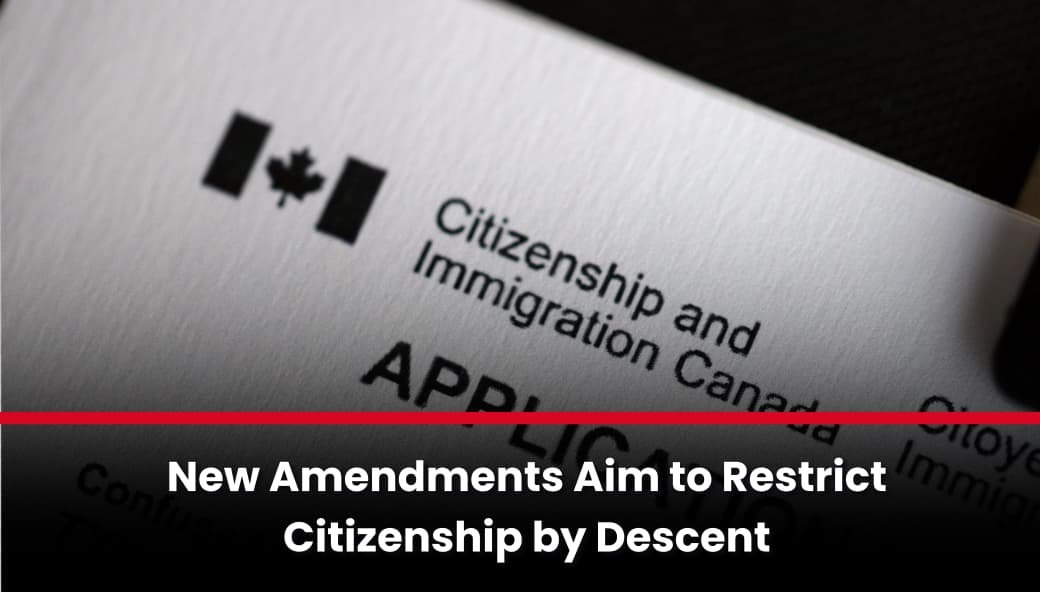If the latest revisions to Bill C-3, An Act to Amend the Citizenship Act, are passed, many children of Canadian citizens will be unable to gain citizenship by descent.
The amendments introduce stricter criteria for children born or adopted outside of Canada on or after the new legislation is enacted. The latest version of the bill significantly narrows the scope of citizenship by descent compared to previous versions.
Get a Legal Consultation on Applying for Proof of Canadian Citizenship
However, children born or adopted before the changes take effect will still be eligible for Canadian citizenship if the bill passes in its current form.
Key Changes in the Latest Amendments
Under the updated bill, children born abroad to Canadian citizens by descent—or those adopted by them—will only be eligible for citizenship if their Canadian parent has lived in Canada for at least three years within a five-year period before the child’s birth or adoption.
This requirement replaces the previous version of the bill, where the three-year residency period (referred to as the “substantial connection to Canada test”) did not need to occur within a specific five-year window.
The revised amendments also introduce new restrictions that were not part of the earlier version:
- Security Assessment: Children aged 18 or older seeking proof of Canadian citizenship will undergo a security assessment. This evaluation will consider concerns related to national security, human rights violations, criminal activity, and economic sanctions, even if their parent meets the residency requirement.
- Language and Cultural Knowledge: Applicants aged 18 to 55 must also prove they have sufficient knowledge of either English or French, as well as an understanding of Canada’s culture, rights, and responsibilities of citizenship.
What is Citizenship by Descent?
Citizenship by descent allows children born outside Canada to inherit Canadian citizenship from their Canadian parent(s) at birth or adoption.
The current version of the Citizenship Act, updated in 2009, introduced a first-generation limit (FGL), preventing children of Canadians who were born or naturalized abroad from passing citizenship onto their own children. The Ontario Superior Court of Justice ruled this FGL unconstitutional in December 2023, prompting the federal government to propose a narrower version through Bill C-3.
Additional Provisions in Bill C-3
Other amendments to Bill C-3 include a requirement that the Immigration Minister submit an annual report to Parliament on individuals who become citizens under the new provisions, as well as a report on any security assessments that are waived.
The deadline for addressing the FGL in the Citizenship Act is November 20, 2025. To become law, Bill C-3 must pass third readings in both Houses of Parliament and receive royal assent.
Interim Measures for “Lost Canadians”
As part of the ongoing efforts to address the FGL, the government is offering interim measures for individuals affected by the current restrictions. These individuals can apply for discretionary grants of citizenship by submitting a proof of citizenship application online, along with the necessary supporting documents. The current processing time for these applications is approximately eight months, though expedited processing is available for individuals facing hardship.
Amendments That Did Not Pass
During the debate, Conservative MP Rempel Garner proposed an amendment to abolish birthright citizenship in Canada. If passed, this would have meant that children born in Canada could only claim citizenship if at least one parent was a Canadian citizen or permanent resident at the time of birth.
This proposed amendment was rejected in a vote, meaning the current system of birthright citizenship remains intact. Under birthright citizenship, any child born in Canada automatically gains Canadian citizenship, with a few exceptions, such as children of foreign diplomats.
Birthright citizenship is relatively rare globally, with most countries, excluding those in the Americas, implementing more restrictive policies similar to the one proposed by Garner.




